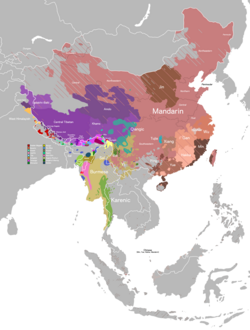References
- 1 2 Hsiu, Andrew. 2016. The classification of Cosao: a Lolo-Burmese language of China and Laos . Presented at the 22nd Himalayan Languages Symposium, Guwahati, India.
- ↑ Lew, Sigrid (2023). "Notes on Luma, a Southern Ngwi language in Laos". Journal of the Southeast Asian Linguistics Society. 16 (2). Honolulu: University of Hawaiʻi Press: xx–xxx. ISSN 1836-6821 . Retrieved 2024-06-15.
- ↑ Hsiu, Andrew. 2018. Classifications of some lesser-known Lolo-Burmese languages.
- Lama, Ziwo Qiu-Fuyuan (2012), Subgrouping of Nisoic (Yi) Languages, thesis, University of Texas at Arlington (archived)
- Kingsadā, Thō̜ngphet, and Tadahiko Shintani. 1999 Basic Vocabularies of the Languages Spoken in Phongxaly, Lao P.D.R. Tokyo: Institute for the Study of Languages and Cultures of Asia and Africa (ILCAA).
- Shintani, Tadahiko, Ryuichi Kosaka, and Takashi Kato. 2001. Linguistic Survey of Phongxaly, Lao P.D.R. Tokyo: Institute for the Study of Languages and Cultures of Asia and Africa (ILCAA).
- Kato, Takashi. 2008. Linguistic Survey of Tibeto-Burman languages in Lao P.D.R. Tokyo: Institute for the Study of Languages and Cultures of Asia and Africa (ILCAA).
